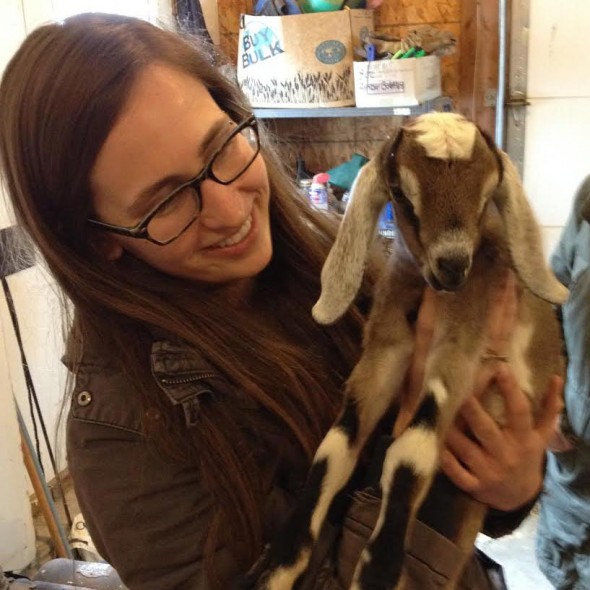Leah's business plan manages to embody both extreme practicality and head-in-the-clouds wish-making, all in one cute package. Now that she has successfully raised the money via Kickstarter to establish a herd of goats, she's embarking on the process of living her dream. In Leah's own words: 'our world needs new farmers, our land needs new ways of raising food, and our bodies need new ways of being nourished.'
When did you know that you wanted to work in food?
I came into the world of food through studying biology, or rather, after becoming frustrated with studying biology and pursuing agriculture. Where science tried to separate out the human element, agriculture, particularly the new agrarian movement, provided me a way to engage with nature, to make personal relationships instead of generalizations. I saw farming as a path to intimacy rather than objectivity. My college didn't have an agriculture degree, so I studied it on my own in the form of summer jobs, one organic vegetable farm after another.
How did you get your current good food job?
I'm in the process of creating my own good food job, a herd I'm calling the DREAMGOATS, via kindness and land from the farmers with whom I've worked for the past four years and a successful Kickstarter campaign. Within our community of sustainable-minded farmers, there's not much dairy representation. I am venturing to raise a herd of goats by way of prairie restoration projects and invasive species removal, interfacing as much as possible with my community in the process.
My work in agriculture up to this point has been mainly in vegetables and in storytelling. I've been gratefully employed by my friends at Green Wagon Farm in Ada, Michigan and given creative control over the voice of the farm, which has allowed me to help build a brand based on the values that the farm upholds. After four years, I'm looking to give voice to my own project. I've chosen goats as my medium because they are charming and capricious, and because they can't be tied down-which mirrors my playful approach to agriculture, a career path which, in so many ways, ties you down. If we're going to use animals, then let's know them as a community-and by extension, let's get to know their habitat. This is a good-food job but also a good-land job-and what better way to bring attention to land than to put goats on it?? Soon enough, we're talking about human habitat and human diet, and we're seeing ourselves as animals and as a part of the food web, as part of the world in a new way.
How did your previous work or life experience prepare you for a good food job?
I've always been tough in the face of discomfort, always enjoyed hard work outdoors, taken pride in physical strength and calloused hands and feet. But I also have this imaginative bent, an absurd idealism that might kill me, a love of art and science, and a knack for getting people excited about ideas. I've met farmers worn by the sun, by the government, by long days and long seasons, and yet, these people have been the most magnanimous, open, and extravagant people I've ever known. Though nobody is "making it" in a conventional sense, everybody was waking up every day and doing it. I never met anybody bored of their land, who found their work redundant and ceased to know the wonder of germination. The earth is wondrous: I believe this; I've tasted its goat milk lattes.
What was the greatest obstacle you had to overcome in pursuing your Good Food Job dream?
The season of not knowing lies before me, and it's terrifying. It's also energizing: full of people who want to help, who like goats, and who care about ecological health and good food. I've worried, of course; I've questioned whether or not I'm cut out for it. The Kickstarter was a real, crazy reminder that there are people out there who are eager to help, and not only help, but to be a part of my project, to take ownership.
Name one positive thing that a former employer taught you that you continue to appreciate?
The gifts of trust & empowerment have been most meaningful to me. The sooner I've starting saying "we," the more stuff I've been capable of getting done. On farms where I've been given creative freedom and autonomy, handed the keys to the truck or pass-code to the website, I've gained confidence about my work and ownership over my responsibilities.
What can you identify as the greatest opportunities in food right now?
In agriculture, there is a great need for collaboration-sharing tools and labor, building distribution pathways, processing equipment. In order for small producers to be effective, they need to be supported by a web of infrastructure: people finding efficient, creative ways to get this food to people who need it. Bring out your middlewomen: mobile slaughterhouses, cooperative mills, veggie vans, organic fast-food joints?
If you could be compensated for your work with something other than money, what would it be?
Soap, cheese, and wool sweaters.









